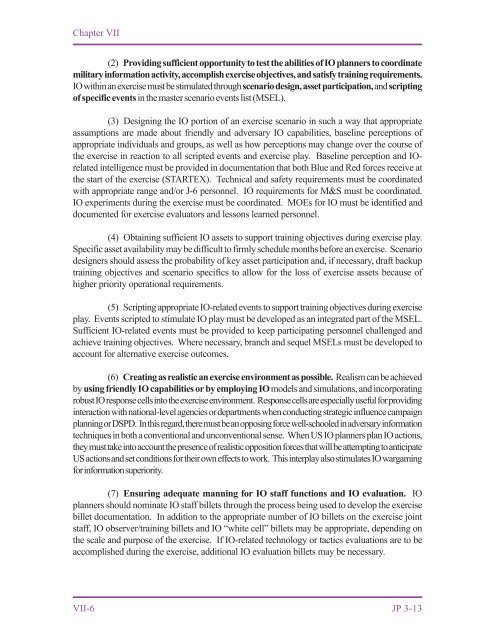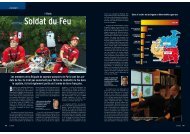Joint Publication 3-13, Information Operations - The Global ...
Joint Publication 3-13, Information Operations - The Global ...
Joint Publication 3-13, Information Operations - The Global ...
Create successful ePaper yourself
Turn your PDF publications into a flip-book with our unique Google optimized e-Paper software.
Chapter VII<br />
(2) Providing sufficient opportunity to test the abilities of IO planners to coordinate<br />
military information activity, accomplish exercise objectives, and satisfy training requirements.<br />
IO within an exercise must be stimulated through scenario design, asset participation, and scripting<br />
of specific events in the master scenario events list (MSEL).<br />
(3) Designing the IO portion of an exercise scenario in such a way that appropriate<br />
assumptions are made about friendly and adversary IO capabilities, baseline perceptions of<br />
appropriate individuals and groups, as well as how perceptions may change over the course of<br />
the exercise in reaction to all scripted events and exercise play. Baseline perception and IOrelated<br />
intelligence must be provided in documentation that both Blue and Red forces receive at<br />
the start of the exercise (STARTEX). Technical and safety requirements must be coordinated<br />
with appropriate range and/or J-6 personnel. IO requirements for M&S must be coordinated.<br />
IO experiments during the exercise must be coordinated. MOEs for IO must be identified and<br />
documented for exercise evaluators and lessons learned personnel.<br />
(4) Obtaining sufficient IO assets to support training objectives during exercise play.<br />
Specific asset availability may be difficult to firmly schedule months before an exercise. Scenario<br />
designers should assess the probability of key asset participation and, if necessary, draft backup<br />
training objectives and scenario specifics to allow for the loss of exercise assets because of<br />
higher priority operational requirements.<br />
(5) Scripting appropriate IO-related events to support training objectives during exercise<br />
play. Events scripted to stimulate IO play must be developed as an integrated part of the MSEL.<br />
Sufficient IO-related events must be provided to keep participating personnel challenged and<br />
achieve training objectives. Where necessary, branch and sequel MSELs must be developed to<br />
account for alternative exercise outcomes.<br />
(6) Creating as realistic an exercise environment as possible. Realism can be achieved<br />
by using friendly IO capabilities or by employing IO models and simulations, and incorporating<br />
robust IO response cells into the exercise environment. Response cells are especially useful for providing<br />
interaction with national-level agencies or departments when conducting strategic influence campaign<br />
planning or DSPD. In this regard, there must be an opposing force well-schooled in adversary information<br />
techniques in both a conventional and unconventional sense. When US IO planners plan IO actions,<br />
they must take into account the presence of realistic opposition forces that will be attempting to anticipate<br />
US actions and set conditions for their own effects to work. This interplay also stimulates IO wargaming<br />
for information superiority.<br />
(7) Ensuring adequate manning for IO staff functions and IO evaluation. IO<br />
planners should nominate IO staff billets through the process being used to develop the exercise<br />
billet documentation. In addition to the appropriate number of IO billets on the exercise joint<br />
staff, IO observer/training billets and IO “white cell” billets may be appropriate, depending on<br />
the scale and purpose of the exercise. If IO-related technology or tactics evaluations are to be<br />
accomplished during the exercise, additional IO evaluation billets may be necessary.<br />
VII-6<br />
JP 3-<strong>13</strong>



